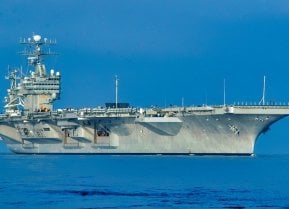Would China Dare Launch a Second Pearl Harbor on America?
The modern version of a Pearl Harbor strike would come not from aircraft carriers but from cyber, ballistic, and cruise missiles launched from submarines off our coast or missiles launched from mainland China.
On December 7th, 1941 – 82 years ago today – Imperial Japan caught our nation by surprise and killed 2,479 Americans and sunk 19 warships at Pearl Harbor. The nation was lucky that critical logistics like the fuel depot, or tanker ships vital to keeping the fleet at-sea were not attacked. A modern foe like China won’t make that mistake. Then and now, the only proven guarantor of peace is strength, and today, that margin is too narrow.
By the late 1930s, it was clear the world and our nation were heading to war, but the attack that December day, at that location, was a shock – even though students of history know that it should not have been. Today, we are once again sleepwalking into a war. However, it isn’t too late to exercise effective deterrence. Time is of the essence, as this decade shapes up to be a very violent one, with the prospect of war with China becoming all too real.
Repeated throughout history, technology has enabled battlefield surprises that must be heeded. The Pearl Harbor attack was enabled by the then-unconventional use of aircraft carriers and their long-range aircraft to strike without detection. The modern version of such a strike would come not from aircraft carriers, but from cyber, ballistic and cruise missiles launched from submarines off our coast or missiles launched from mainland China. Unlike 1941, the homeland is no longer beyond the reach of our principal foe: China.
This 2023 vulnerability makes it vital that the homeland’s industry be protected as the nation is not the world’s factory – that title is held by China. Industry’s most likely and demonstrated vulnerability is from a massive, coordinated cyberattack enabled by what has become too common daily cyber breaches and system-weakening assaults. Doing better is vital, but winning in the cyber domain won’t deter a war with China – that requires viable hard power.
Effective deterrence today requires presenting Beijing’s leaders two things – a military able to blunt an initial onslaught backed with capacity to wage a protracted fight. Our military today is too weak and not present in the numbers to prevent what Elbridge Colby calls a fait accompli assault that would be too costly to reverse. For this, numbers matter, but today’s weakness relative China would likely lead to a prolonged war – and for that, logistics is paramount.
In this scenario, victory requires our military being sustained on the battlefield. Key to doing that is conducting rapid battle-damage repairs so warships are returned to the fight, aircraft kept fueled, and our defense industry fed resources from around the world. This all hinges on commercial ships which we don’t have. Some leaders in Congress are realizing this and beginning to act, but reversing this and securing vital sealift will take years even with vigorous action today.
Assuming leadership and action is taken tomorrow to build the military required and shoring up our industry, it will take time to deliver on – and the Chinese aren’t waiting. They have been waging a positional fight through the Belt and Road Initiative to secure strategic footholds to separate the U.S. from resources, and from which to operate and sustain their military and wartime economy. Near-term deterrence requires sowing doubt in Beijing’s mind.
One way to do this: handing Beijing defeats in today’s great game centered on the Indo-Pacific. This positional competition has seen a series of defeats as China’s military secure strategic footholds around the world – Ream, Cambodia just days ago opened a new base hosting Chinese warships, and Solomon Islands signed a security pact with Beijing seeing security forces arrive there.
In short, to avert war the nation must begin winning in the great game for strategic position, while investing and delivering on a viable military and industry able to wage a long war. Without this, a modern Pearl Harbor and a subsequent long war occurring is only a matter of time.
About the Author
Brent Sadler joined Heritage Foundation after a 26-year Navy career with numerous operational tours on nuclear-powered submarines, personal staffs of senior Defense Department leaders, and as a military diplomat in Asia. As a Senior Research Fellow, Brent’s focus is on maritime security and the technologies shaping our future maritime forces, especially the Navy.
Image Credit: Shutterstock.


